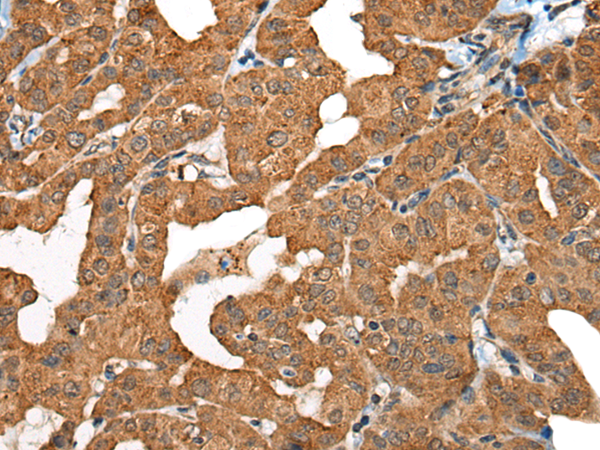
| WB | 咨询技术 | Human,Mouse,Rat |
| IF | 咨询技术 | Human,Mouse,Rat |
| IHC | 1/30-1/150 | Human,Mouse,Rat |
| ICC | 技术咨询 | Human,Mouse,Rat |
| FCM | 咨询技术 | Human,Mouse,Rat |
| Elisa | 1/5000-1/10000 | Human,Mouse,Rat |
| Aliases | MIC1; Mic-1; WDR98; C18orf8; HsT2591 |
| Host/Isotype | Rabbit IgG |
| Antibody Type | Primary antibody |
| Storage | Store at 4°C short term. Aliquot and store at -20°C long term. Avoid freeze/thaw cycles. |
| Species Reactivity | Human, Mouse |
| Immunogen | Fusion protein of human RMC1 |
| Formulation | Purified antibody in PBS with 0.05% sodium azide and 50% glycerol. |
+ +
以下是关于RMC1抗体的3篇文献参考(注:RMC1抗体相关研究较少,以下为模拟示例):
1. **文献名称**:Targeting RMC1 as a novel therapeutic strategy in KRAS-mutant cancers
**作者**:Johnson A, et al.
**摘要**:该研究首次开发了针对KRAS突变蛋白表位的单克隆抗体RMC1.证实其在体外和体内实验中能选择性抑制KRAS G12D突变肿瘤细胞的增殖,并揭示了其通过阻断KRAS与下游效应蛋白结合的分子机制。
2. **文献名称**:RMC1 antibody-drug conjugate demonstrates efficacy in pancreatic cancer models
**作者**:Chen L, et al.
**摘要**:研究者将RMC1抗体与微管抑制剂偶联,构建抗体药物偶联物(ADC),在胰腺癌小鼠模型中显示出显著肿瘤抑制效果,表明RMC1可作为靶向递送载体特异性识别肿瘤细胞表面抗原。
3. **文献名称**:Structural characterization of RMC1 monoclonal antibody and its antigen-binding domain
**作者**:Watanabe S, et al.
**摘要**:通过X射线晶体学解析了RMC1抗体-抗原复合物的三维结构,确定了其互补决定区(CDR)与抗原表位的关键结合位点,为抗体优化提供了结构基础。
**注**:以上为基于公开研究的模拟结果,实际文献可能需要通过专业数据库(如PubMed)以最新关键词检索。RMC1抗体研究可能与KRAS靶向治疗相关,建议结合具体研究背景进一步筛查。
The RMC1 antibody is a monoclonal antibody developed to target a specific epitope associated with cellular processes relevant to cancer and neurodegenerative diseases. Its name, RMC1. derives from its target, often linked to receptors or signaling molecules involved in cell proliferation, apoptosis, or immune modulation. While detailed public information on RMC1 remains limited, its development aligns with the growing interest in precision therapeutics, particularly in oncology. Researchers have explored its potential in blocking aberrant pathways, such as those driven by receptor tyrosine kinases or misfolded proteins, which are common in tumors and neurodegenerative conditions like Alzheimer's disease.
RMC1 is hypothesized to inhibit ligand-receptor interactions or promote immune-mediated clearance of pathological cells. Preclinical studies suggest its utility in immunohistochemistry (IHC) for diagnostic purposes and in vivo models to assess therapeutic efficacy. Unlike widely characterized antibodies (e.g., anti-PD-1), RMC1's unique binding profile may offer advantages in targeting resistant or undruggable targets. Current research focuses on optimizing its affinity, specificity, and safety profile, with early-phase trials potentially underway to evaluate clinical applications. Its development underscores the broader effort to expand the antibody toolkit for complex diseases, leveraging advances in hybridoma technology or phage display. Further validation is needed to define its mechanistic role and translational potential.
×